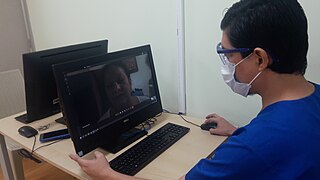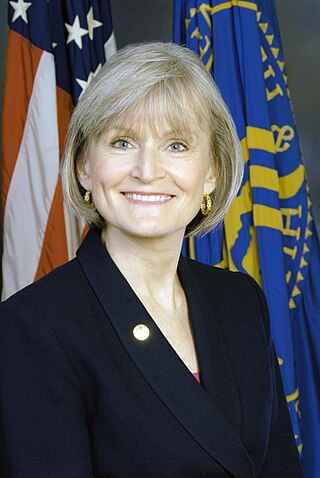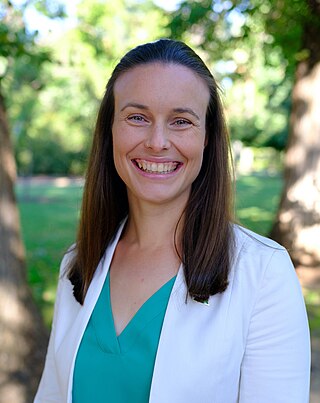Related Research Articles
In the medical profession, a general practitioner (GP) or family physician is a doctor who is a consultant in general practice. GPs have distinct expertise and experience in providing whole person medical care whilst managing the complexity, uncertainty and risk associated with the continuous care they provide. GPs work at the heart of their communities, striving to provide comprehensive and equitable care for everyone, taking into account their health care needs, stage of life and background. GPs work in, connect with and lead multidisciplinary teams that care for people and their families, respecting the context in which they live, aiming to ensure all of their physical and mental health needs are met. They are trained to treat patients to levels of complexity that vary between countries. The term "primary care physician" is more usually used in the US.

The Australian Medical Association (AMA) is an Australian public company by guarantee formed as a professional association for Australian doctors and medical students. The association is not run by the Australian Government and does not regulate or certify doctors, a responsibility which lies with the Medical Board of Australia and the Australian Health Practitioner Regulation Agency. The association's national headquarters are located in Barton, Australian Capital Territory, in addition to the offices of its branches in each of the states and territories in Australia.

Telehealth is the distribution of health-related services and information via electronic information and telecommunication technologies. It allows long-distance patient and clinician contact, care, advice, reminders, education, intervention, monitoring, and remote admissions. Telemedicine is sometimes used as a synonym, or is used in a more limited sense to describe remote clinical services, such as diagnosis and monitoring. When rural settings, lack of transport, a lack of mobility, conditions due to outbreaks, epidemics or pandemics, decreased funding, or a lack of staff restrict access to care, telehealth may bridge the gap as well as provide distance-learning; meetings, supervision, and presentations between practitioners; online information and health data management and healthcare system integration. Telehealth could include two clinicians discussing a case over video conference; a robotic surgery occurring through remote access; physical therapy done via digital monitoring instruments, live feed and application combinations; tests being forwarded between facilities for interpretation by a higher specialist; home monitoring through continuous sending of patient health data; client to practitioner online conference; or even videophone interpretation during a consult.

Family medicine is a medical specialty within primary care that provides continuing and comprehensive health care for the individual and family across all ages, genders, diseases, and parts of the body. The specialist, who is usually a primary care physician, is named a family physician. It is often referred to as general practice and a practitioner as a general practitioner. Historically, their role was once performed by any doctor with qualifications from a medical school and who works in the community. However, since the 1950s, family medicine / general practice has become a specialty in its own right, with specific training requirements tailored to each country. The names of the specialty emphasize its holistic nature and/or its roots in the family. It is based on knowledge of the patient in the context of the family and the community, focusing on disease prevention and health promotion. According to the World Organization of Family Doctors (WONCA), the aim of family medicine is "promoting personal, comprehensive and continuing care for the individual in the context of the family and the community". The issues of values underlying this practice are usually known as primary care ethics.

Medical education in Australia includes the educational activities involved in the initial and ongoing training of Medical Practitioners. In Australia, medical education begins in Medical School; upon graduation it is followed by a period of pre-vocational training including Internship and Residency; thereafter, enrolment into a specialist-vocational training program as a Registrar eventually leads to fellowship qualification and recognition as a fully qualified Specialist Medical Practitioner. Medical education in Australia is facilitated by Medical Schools and the Medical Specialty Colleges, and is regulated by the Australian Medical Council (AMC) and Australian Health Practitioner Regulation Agency (AHPRA) of which includes the Medical Board of Australia where medical practitioners are registered nationally.

The Royal Australian College of General Practitioners (RACGP) is the professional body for general practitioners (GPs) in Australia. The RACGP is responsible for maintaining standards for quality clinical practice, education and training, and research in Australian general practice. The RACGP represents over 40,000 members across metropolitan, urban, rural and remote Australia.
Michael Richard Lewis Wooldridge is an Australian doctor, company director, and former politician. He served as deputy leader of the Liberal Party from 1993 to 1994, under John Hewson. In the Howard government, he held ministerial office as Minister for Health and Family Services (1996–1998) and Health and Aged Care (1998–2001). He represented the Liberals in the House of Representatives as the member for Chisholm (1987–1998) and Casey (1998–2001).

NHS Scotland, sometimes styled NHSScotland, is the publicly–funded healthcare system in Scotland and one of the four systems that make up the National Health Service in the United Kingdom. It operates 14 territorial NHS boards across Scotland, supported by seven special non-geographic health boards, and Public Health Scotland.

In medicine, rural health or rural medicine is the interdisciplinary study of health and health care delivery in rural environments. The concept of rural health incorporates many fields, including wilderness medicine, geography, midwifery, nursing, sociology, economics, and telehealth or telemedicine.
The Royal New Zealand College Of General Practitioners is a professional body and postgraduate educational institute that sets standards for general practice in New Zealand, providing research, assessment, ongoing education, advocacy and support for general practitioners and general practice.
Christine Mary Robertson is an Australian politician and former Labor Party member of the New South Wales Legislative Council, serving from 2003 until her retirement in 2011.

Mary Wakefield is an American nurse and health care administrator, who served in the Obama administration as acting United States Deputy Secretary of Health and Human Services from 2015 to 2017, and as head of the Health Resources and Services Administration from 2009 to 2015.
The National Rural Health Alliance (NRHA) is Australia's peak non-government organisation for rural and remote health.
Michael Richard Kidd is an Australian medical practitioner, academic and author. He is Professor of Global Primary Care and Future Health Systems at the University of Oxford and Director of the Centre for Future Health Systems at the University of New South Wales. He is a past president of the Royal Australian College of General Practitioners (RACGP) a past president of the World Organization of Family Doctors (WONCA) and former Deputy Chief Medical Officer with the Australian Government Department of Health and Aged Care.

Telepharmacy is the delivery of pharmaceutical care via telecommunications to patients in locations where they may not have direct contact with a pharmacist. It is an instance of the wider phenomenon of telemedicine, as implemented in the field of pharmacy. Telepharmacy services include drug therapy monitoring, patient counseling, prior authorization and refill authorization for prescription drugs, and monitoring of formulary compliance with the aid of teleconferencing or videoconferencing. Remote dispensing of medications by automated packaging and labeling systems can also be thought of as an instance of telepharmacy. Telepharmacy services can be delivered at retail pharmacy sites or through hospitals, nursing homes, or other medical care facilities.
Dr Eugen Molodysky OAM, MMBS is an academic and medical practitioner in preventive medicine and translational research. His research has been published in peer reviewed journals over the last 30 years. His clinical work has contributed to the early identification of HIV/AIDS in the 1980s epidemic in Australia.
Geraldine Michelle Moses, is an Australian doctor of clinical pharmacy, a consultant pharmacist, and an Adjunct Associate Professor of clinical pharmacy at the University of Queensland. She is a Senior Clinical Pharmacist at Mater Pharmacy Services in Brisbane.
Elizabeth Mary Chiarella AM is an Australian academic who specialises in issues relating to nursing, midwifery and the law. She is Professor Emerita at the University of Sydney, Australia and has been at the forefront of many regulatory changes to nursing practice and the nursing workforce and midwifery. These include the introduction of nurse practitioners into Australia, the move from a state based to a national regulatory system and, for midwifery, the introduction of the world's first Doctor of Midwifery and the establishment of the framework for state funded home birth midwifery in New South Wales (NSW), Australia. She is a nurse and midwife, who specialised initially in anaesthetic nursing and later in palliative care.
Dr Michael Joseph Holland is an Australian politician and former obstetrician in southern NSW. He is a member of the Australian Labor Party (ALP) and was elected at the 2022 Bega state by-election for the New South Wales Legislative Assembly.

Dr Amanda Cohn is an Australian politician and former rural general practitioner (GP). She was elected to the New South Wales Legislative Council on 25 March 2023 as a member of The Greens NSW. Prior to entering state politics, she was a Councillor and Deputy Mayor at Albury City Council.
References
- ↑ "Welcome - Rural Doctors Association of Australia". www.rdaa.com.au.
- ↑ "Archived copy". Archived from the original on 5 April 2019. Retrieved 18 September 2012.
{{cite web}}: CS1 maint: archived copy as title (link) - ↑ "North Coast GP Training". Archived from the original on 29 October 2016. Retrieved 18 September 2012.
- ↑ "RACGP - RACGP Rural".
- ↑ "North Coast Medical Education Collaboration - Homepage". Archived from the original on 9 April 2011. Retrieved 22 July 2022.
- ↑ "RACGP - The Royal Australian College of General Practitioners".
- ↑ "RACGP - Executive summary".
- ↑ "RACGP - Rural Generalist Fellowship".
- ↑ "Health increases telehealth bounty for specialists - Department of Health and Ageing (DoHA), telehealth - Computerworld". Archived from the original on 20 April 2013. Retrieved 18 September 2012.
- ↑ "GP11 Conference". Archived from the original on 10 April 2013. Retrieved 18 September 2012.
- ↑ "General Practice" (PDF). 23 March 2021.
- ↑ "RACGP - Telehealth".
- ↑ "Video consulting telehealth – from hospitals to the home and everywhere in between". 15 November 2011.
- ↑ GP Conference [ dead link ]
- ↑ "Membership of North Coast Area Health Advisory Council - NSW Department of Health". Archived from the original on 28 June 2009. Retrieved 23 January 2010.
- ↑ "Health NSW".
- ↑ "Visiting medical officer".
- ↑ "News".
- ↑ "Archived copy" (PDF). Archived from the original (PDF) on 2 September 2007. Retrieved 23 January 2010.
{{cite web}}: CS1 maint: archived copy as title (link) - ↑ "Doctors seek more rural hospital funding". Melbourne: The Age. 28 September 2004. Retrieved 14 January 2008.
- ↑ "AM Archive – Struggle for rural medical services". www.abc.net.au. Retrieved 14 January 2008.
- ↑ "Archived copy" (PDF). Archived from the original (PDF) on 21 March 2012. Retrieved 18 September 2012.
{{cite web}}: CS1 maint: archived copy as title (link) - ↑ "Major organisations unite to bring good health to the bush: Australian Local Government Association media releases 2004". Archived from the original on 2 March 2011. Retrieved 23 January 2010.
- ↑ "AMA strongly supports National Disability Insurance Scheme". Australian Medical Association. 10 August 2011.
- ↑ Our Services 17 July 2004 [ dead link ]
- ↑ "Practice Support" (PDF).
- ↑ Medicare
- ↑ Future Health Leaders [ dead link ]
- ↑ Australian College of Rural and Remote Medicine [ dead link ]
- ↑ "Girls selected as trainees for Diplomatic Service". Australian Women's Weekly. 17 April 1943.
- ↑ "Doc Evatt's quiz kid bolted at every barrier". The Sydney Morning Herald.
- ↑ "'Wife and Baggage to Follow': DFAT launches a social history of women and wives in Australia's foreign service - Public Diplomacy - Department of Foreign Affairs and Trade". Archived from the original on 20 March 2014.
- ↑ "David Page - Recipient -". valor.militarytimes.com.
- ↑ "David Maddison Lecturer asks who gets to shape our future / Current news / The University of Newcastle, Australia". Archived from the original on 1 December 2008. Retrieved 23 January 2010.
- ↑ "Robert for Environment". 11 September 2011.
- ↑ "Archived copy" (PDF). Archived from the original (PDF) on 20 March 2014. Retrieved 20 March 2014.
{{cite web}}: CS1 maint: archived copy as title (link) - ↑ Alex Easton. (20 April 2011). Hitchin a ride for cancer cure The Daily Telegraph . Retrieved 19 November 2022
- ↑ "AM - Coaltion [sic] divided over nuclear power expansion". Australian Broadcasting Corporation .
- ↑ "ACF - Nuclear Vision - From Inevitable to Invisible". www.acfonline.org.au. Archived from the original on 23 July 2008.
- ↑ "NSW DIVISION – RICHMOND". AEC . Retrieved 4 February 2008.
- ↑ Health publications 2004 [ dead link ]